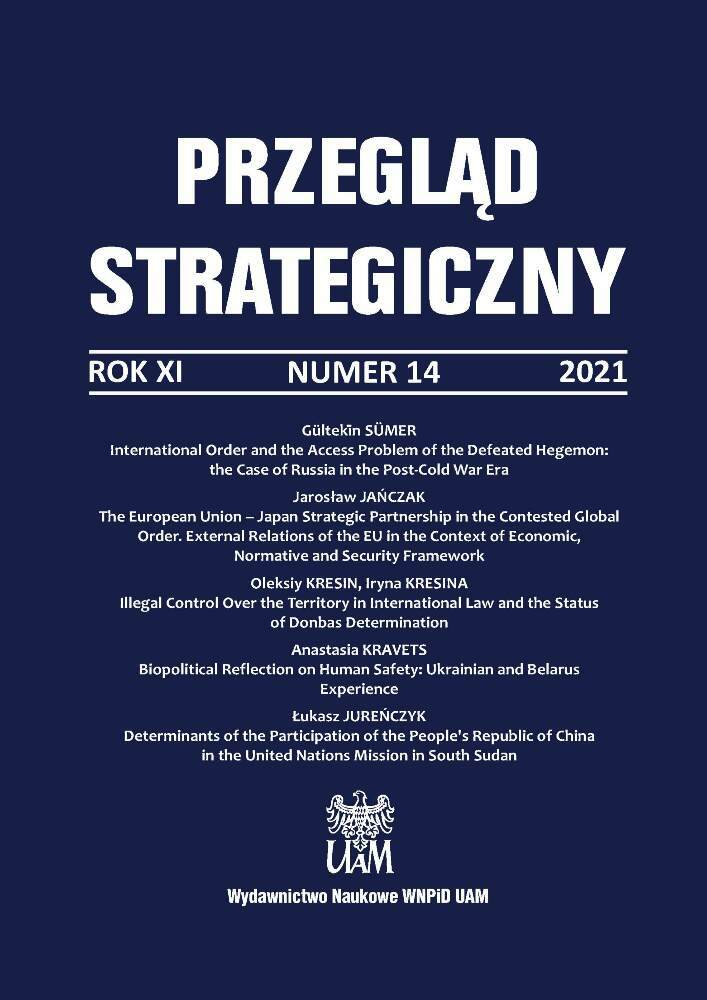Abstract
One of the main characteristics of the post-Soviet transformation was the religious resurgence. The purpose of this paper is to analyse the post-Soviet Islamic revival in the 1990s. The awakening of Islam and seeking the place for Muslims in the society significantly influenced the formation of today’s Russian Federation. The authors examine the factors that influenced the role of Islam in newly created post-Soviet Russia and the federal government’s response to its dynamics. The paper is divided into two parts. The first part deals with the Islamic revival after the dissolution of the Soviet Union. The second chapter is focused on the Kremlin’s reaction to new radical movements that emerged during the Islamic awakening and the separatist sentiments in Russia’s Muslim regions. Using the qualitative research method, the authors drew a conclusion that Islamic radicalisation in post-Soviet Russia was caused by several external and internal factors. The political developments in the Russian Federation between the second half of the 1990s and the early 21st century were characterised by restrictions on religious freedom and consolidation of federalism.
References
Akhmetova E. (2013), Islam in Russia: Historical Facts and Modern Developments, Kuala Lumpur.
Alexseev M. A., Zhemukhov S. N. (2017), Mass Religious Ritual and Intergroup Tolerance: The Muslim Pilgrims’ Paradox, Cambridge.
Arnold V. (2012), The place(s) of Islam in Soviet and post-Soviet Russia, in: Soviet and Post-Soviet Identities, (eds.) M. Bassin, C. Kelly, New York.
Bobrovnikov V. (2001), Post-Socialist Forms of Islam Caucasian Wahhabis, “ISIM Newsletter”, Vol. 7, No. 1.
Bobrovnikov V. (2006), Religious Culture In Dagestan: From Socialist To Islamic Revolution?, “Russian Cultural Review”, Vol. 9.
Bobrovnikov V. (2006), The Wahhabites In The North Caucasus: Fears And Realities, “Russian Cultural Review”, Vol. 9.
Decree of the President of the Russian Federation N. 168 on March 21, 2014 “On the formation of the Crimean Federal District”.
Decree of the President of the Russian Federation N. 849 on May 13, 2000 (as amended on 13.12.2018) “On the Plenipotentiary Representative of the President of the Russian Federation in the Federal District”.
Falkowski M. (2016), Russia’s ‘Middle East’: the escalation of religious conflicts in the Northern Caucasus, “OSW Commentary”, No. 207.
Federal Law of the Russian Federation N. 114-FZ Of 25 July 2002 “On Countering extremist Activity”.
Federal Law of the Russian Federation N. 125-FZ Of September 26, 1997 “On The Freedom Of Conscience And Religious Associations”.
Halbach U. (2001), Islam in the North Caucasus, “Archives de sciences sociales des religions”, Vol. 115, https://doi.org/10.4000/assr.18403.
Hunter S. (2004), Islam In Russia: The Politics Of Identity And Security, London–New York.
Iliyasov M. (2020), Radicalisation and Resilience Case Study: Russia, The GREASE project, http://grease.eui.eu/wp-content/uploads/sites/8/2020/10/WP4-Report_Russia-1.pdf.
Malashenko A. (2003), Dva neskhozhikh renessansa [The two different Renaissances], „Отечественные записки” [The Domestic notes], Vol. 5, No. 14.
Malashenko A. (2015), Islamic Challenges to Russia, From the Caucasus to the Volga and the Urals, in: Putin’s Russia: How It Rose, How It Is Maintained, and How It Might End, (eds.) L. Aron, Washington.
Mchedlova M. M., Kofanova E. N. (2020), Russia in Anticipation of Changes: Religious Factor and Socio-political Preferences, “RUDN Journal of Political Science”, Vol. 22, No. 1, https://doi.org/10.22363/2313-1438-2020-22-1-7-21.
Merati S. E. (2017), Muslims in Putin‘s Russia: Discourse on Identity, Politics, and Security, Cham.
Moukhariamov N. M. (1997), The Tatarstan Model: A Situational Dynamic, in: Beyond the Monolith: The Emergence of Regionalism in Post-Soviet Russia, (eds.) P. J. Stavrakis, J. DeBardeleben, L. Black, Washington–Baltimore–London.
Ramet S. P. (1993), Religious policy in the Soviet Union, New York.
Sweet J. (2016), From the Post-Soviet Godless Legacy to Radical Islam: Russian Converts, “Global Security Studies”, Vol. 7, No. 1.
The Law of the Ingush Republic, “On the Ban of Wahhabi and Other Extremist Activities on the Territory of Ingush Republic”, 1998.
The Law of the Republic of Dagestan, “On Banning Wahhabi and Other Extremist Activities on the Territory of the Republic of Dagestan”, 1999.
The Law of the Russian Soviet Federative Socialist Republic from October 25, 1990 N. 267-1 “About the Religious Freedom”.
The Law of the USSR from October 1, 1990 N. 1689-1 “About the Freedom of Conscience and Religious Organizations”.
Treaty Between the Russian Federation and the Republic of Tatarstan “On Delimitation of Jurisdictional Subjects and Mutual Delegation of Powers between the State Bodies of the Russian Federation and the State Bodies of the Republic of Tatarstan”, 15.02.1994.
Trenin D. V., Malashenko A. (2004), Russia‘s restless frontier: The Chechnya factor in post-Soviet Russia, Washington.
Tsygankov A. P. (2016), Russia’s Foreign Policy: Change and Continuity in National Identity, Lanham–Boulder–New York–London.
Wilhelmsen J. (2005), Between a Rock and a Hard Place: The Islamisation of the Chechen Separatist Movement, “Europe – Asia Studies”, Vol. 57, No. 2.
Yemelianova G. M. (2002), Russia and Islam: A Historical Survey, Hampshire–New York.
Yemelianova G. M. (2010), Radical Islam in the Former Soviet Union, London–New York.
Yemelianova G. M. (2016), Muslim-State Relations in Russia, in: Muslim Minority-State Relations, (eds.) R. Manson, Hampshire–New York.
Zhemukhov S. N. (2018), The North Caucasus: How Islam and Nationalism Shaped Stability and Conflict in the Region, in: Religion, Conflict, and Stability in the Former Soviet Union, (eds.) K. Migacheva, B. Frederick, Santa Monica.

